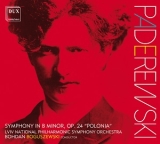Ist es purer Zufall, oder kommt Paderewskis Symphonie Polonia gerade jetzt in seinem Heimatland wieder besondere Bedeutung zu? Nachdem das Chopin-Institut vor einem Jahr eine Aufnahme mit dem Royal Philharmonic Orchestra veröffentlicht hatte (siehe unten) zieht jetzt das polnische Label Dux mit einer Einspielung des Lviv National Philharmonic Symphony Orchestra nach.
Hier wird die Polen-Connection sogar noch deutlicher, da die Symphonie 1910 im damals noch polnischen Lviv (Lemberg) ihre polnische Premiere feierte.
Mögen das Werk und sein Komponist in diesem Fall sehr eng mit der polnischen Geschichte und dem Streben des Landes nach Unabhängigkeit verbunden sein, so kann man die Symphonie über 100 Jahre nach ihrem Entstehen nicht nur durch die historische Brille sehen.
Bohdan Boguszewski verzichtet auf übersteigertes, heroisches Pathos, nimmt sich sowohl im religiös getünchten Finale (mit Orgel) des ersten Satzes zurück als auch im triumphierenden Gestus des Finale.
Die größte Herausforderung in diesem monumentalen Werk sind ohnehin die epischen Längen, die hier nie in Langeweile münden. Bohdan Boguszewski und das Lviv National Philharmonic Symphony Orchestra halten die Musik unter ständiger Spannung, spielen ebenso konzentriert wie leidenschaftlich und intensiv. Sie dosieren die wiederkehrenden, oft hoch emotionalen Passagen mit Maß, ohne dass die hymnischen Höhen ins Plakative abrutschen und melancholische, intime Momente zu sentimental klingen.
Derart gelingt eine tiefgreifende, dramatische Gestaltung eines historisch stark beladenen Werkes, das in dieser Lesart auch heutigen Hörern noch etwas zu sagen hat.
Is it pure coincidence, or does Paderewski’s Polonia Symphony have special significance in his home country again right now? After the Chopin Institute released a recording with the Royal Philharmonic Orchestra a year ago (see below), the Polish label Dux is now following suit with a recording by the Lviv National Philharmonic Symphony Orchestra.
Here the Polish connection becomes even clearer, as the symphony had its Polish premiere in 1910 in Lviv (Lviv), which was still Polish at the time.
In this case, the work and its composer may be very closely connected to Polish history and the country’s quest for independence, but the symphony cannot be seen only through historical glasses more than 100 years after it was written.
Bohdan Boguszewski refrains from excessive, heroic pathos, taking a step back both in the religious ending (with organ) of the first movement and in the triumphant gesture of the finale.
The greatest challenge in this monumental work is in any case the epic lengths, which here never end in boredom. Bohdan Boguszewski and the Lviv National Philharmonic Symphony Orchestra keep the music under constant tension, playing with as much concentration as passion and intensity. They carefully dose the recurring, often highly emotional passages, so that the hymnal highs never are slipping into the placative or melancholy, and intimate moments don’t sound too sentimental.
The result is a profound, dramatic shaping of a historically heavily laden work, which in this reading still has something to say to today’s listeners.






















